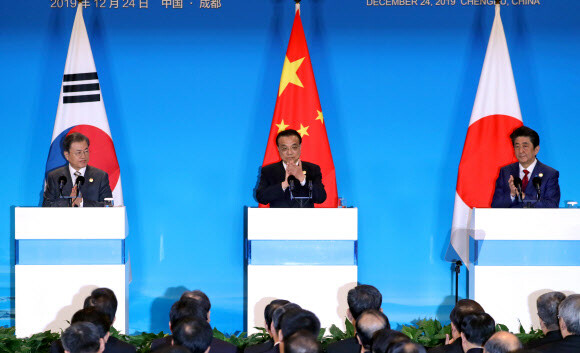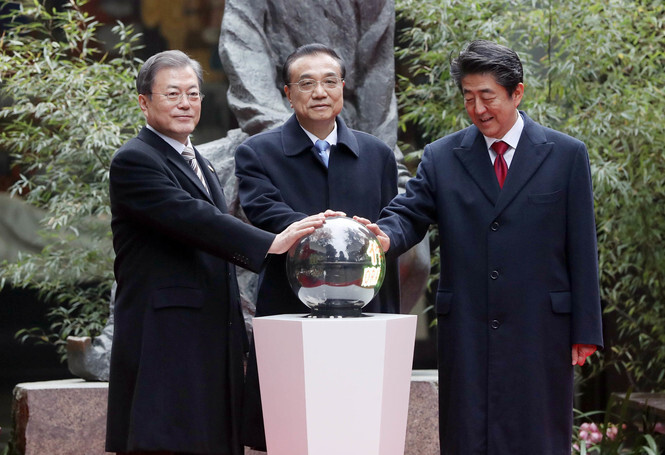hankyoreh
Links to other country sites 다른 나라 사이트 링크
In trilateral summit, S. Korea, China, and Japan agree to push for denuclearization and renewed N. Korea-US dialogue

During a summit on Dec. 24, South Korean President Moon Jae-in, Chinese Premier Li Keqiang, and Japanese Prime Minister Shinzo Abe agreed to “continue close communication and cooperation for denuclearization and lasting peace on the Korean Peninsula.” The three leaders also agreed about the importance of working together to speed up negotiations for a trilateral free trade agreement (FTA).
“We shared the view that peace on the Korean Peninsula corresponds to the joint interests of our three countries and agreed to work toward meaningful progress on denuclearization and peace through the quick resumption of dialogue between North Korea and the US,” said Moon during a joint press conference that followed the trilateral summit, held at the Century City New International Convention & Exhibition Center in Chengdu, in China’s Sichuan Province, on Tuesday morning.
“We reconfirmed that we share the goal of achieving the denuclearization of the Korean Peninsula and lasting peace in Northeast Asia,” said Li Keqiang, adding, “We will dedicate our energy to resolving Korean Peninsula issues through political and diplomatic means, and we will realize long-term safety in the Korean Peninsula and the region. China is prepared to cooperate with South Korea, Japan, and a fourth country.” Li was presumably referring to the possibility of China cooperating or interceding with North Korea.

However, the remarks by Shinzo Abe differed in tone from that of the South Korean and Chinese leaders. “North Korea’s repeated ballistic missile launches are a violation of UN Security Council resolutions and a severe threat to regional security. We reconfirmed that fully implementing Security Council resolutions and maintaining the momentum for the North Korea-US negotiations are the shared position of our three countries,” Abe said, while also emphasizing “a swift resolution to the kidnapping issue.”
On Tuesday, the three leaders also stressed the need to strengthen cooperation in the areas of the economy, society, and the environment and to stimulate cultural and person-to-person exchange in the region.
“We [South Korea, China, and Japan] also share a common economic destiny. I hope that trilateral economic cooperation will be further strengthened so that we can develop together in a system of collaboration and division of labor,” Moon said during his opening remarks before the summit. Moon’s emphasis on collaboration and the division of labor as being the foundation of economic development in the three countries can also be seen as an oblique criticism of Japan’s export controls on South Korea.
“All of us support free trade and economic investment,” asserted Li, arguing that “all parties should quickly sign the Regional Comprehensive Economic Partnership.” The Regional Comprehensive Economic Partnership (RCEP) represents an attempt to create a massive free trade area consisting of 16 countries, including South Korea, China, Japan, India, and the ten member states of the Association of Southeast Asian Nations, or ASEAN. Last month, all the negotiating parties except for India reached an agreement about the RCEP text. Li also emphasized that China, South Korea, and Japan will accelerate their negotiations for an FTA of their own.
“I said that our plan is to push for the swift signing of the RCEP by the 16 negotiating countries and confirmed that we will be working toward a trilateral FTA involving Japan, China, and South Korea,” Abe said.
The three countries have held 16 rounds of negotiations aimed at such a trilateral FTA since 2013, but conflicting interests have prevented them from reaching an agreement. This summit is expected to speed up the negotiations. Since the sectors valued or protected by each country vary, including agriculture and services, they’re likely to agree on mutually acceptable areas for now and then to reach a more sweeping agreement in future negotiations.
After completing their summit, the three leaders adopted a joint vision for the next decade, which calls for strengthening free trade and multilateralism and striving to achieve the complete denuclearization of the Korean Peninsula and maintain peace and stability in Northeast Asia.
Photo caption: South Korean President Moon Jae-in, Chinese Premier Li Keqiang, and Japanese Prime Minister Shinzo Abe attend a ceremony unveiling a monument celebrating 20 years of cooperation between their three countries at the Du Fu Thatched Cottage in Chengdu, in China’s Sichuan Province, on Dec. 24.
By Park Min-hee and Hong Dae-sun, senior staff writers
Please direct comments or questions to [english@hani.co.kr]

Editorial・opinion
![[Column] Season 2 of special prosecutor probe may be coming to Korea soon [Column] Season 2 of special prosecutor probe may be coming to Korea soon](https://flexible.img.hani.co.kr/flexible/normal/500/300/imgdb/original/2024/0426/3317141030699447.jpg) [Column] Season 2 of special prosecutor probe may be coming to Korea soon
[Column] Season 2 of special prosecutor probe may be coming to Korea soon![[Column] Park Geun-hye déjà vu in Yoon Suk-yeol [Column] Park Geun-hye déjà vu in Yoon Suk-yeol](https://flexible.img.hani.co.kr/flexible/normal/500/300/imgdb/original/2024/0424/651713945113788.jpg) [Column] Park Geun-hye déjà vu in Yoon Suk-yeol
[Column] Park Geun-hye déjà vu in Yoon Suk-yeol- [Editorial] New weight of N. Korea’s nuclear threats makes dialogue all the more urgent
- [Guest essay] The real reason Korea’s new right wants to dub Rhee a founding father
- [Column] ‘Choson’: Is it time we start referring to N. Korea in its own terms?
- [Editorial] Japan’s rewriting of history with Korea has gone too far
- [Column] The president’s questionable capacity for dialogue
- [Column] Are chaebol firms just pizza pies for families to divvy up as they please?
- [Column] Has Korea, too, crossed the Rubicon on China?
- [Correspondent’s column] In Japan’s alliance with US, echoes of its past alliances with UK
Most viewed articles
- 1AI is catching up with humans at a ‘shocking’ rate
- 2Korea’s 1.3% growth in Q1 signals ‘textbook’ return to growth, says government
- 3No good, very bad game for Korea puts it out of Olympics for first time since 1988
- 4[Column] Park Geun-hye déjà vu in Yoon Suk-yeol
- 5[Column] Season 2 of special prosecutor probe may be coming to Korea soon
- 6Division commander ordered troops to enter raging flood waters before Marine died, survivor says
- 7Is Japan about to snatch control of Line messenger from Korea’s Naver?
- 8After election rout, Yoon’s left with 3 choices for dealing with the opposition
- 9Will NewJeans end up collateral damage in internal feud at K-pop juggernaut Hybe?
- 10Marriages nosedived 40% over last 10 years in Korea, a factor in low birth rate